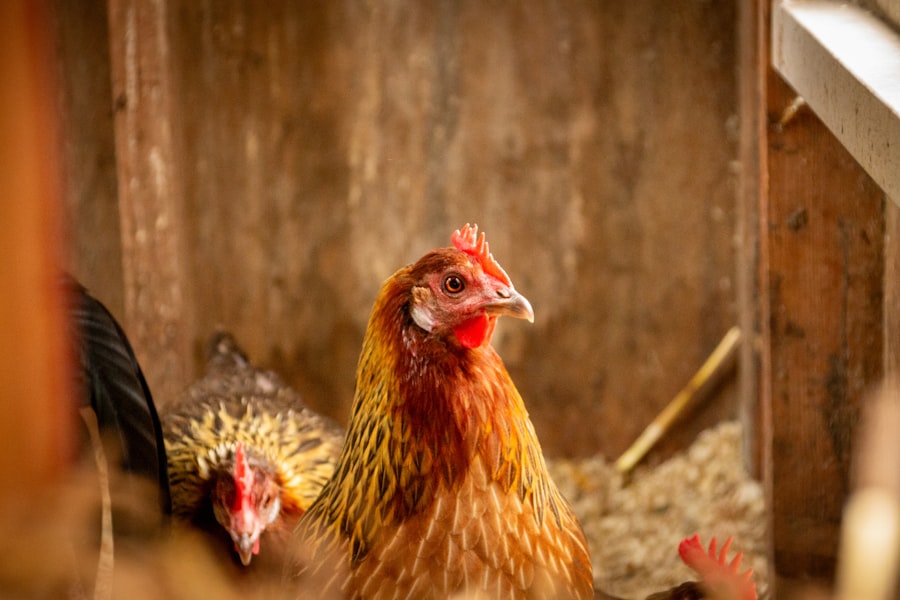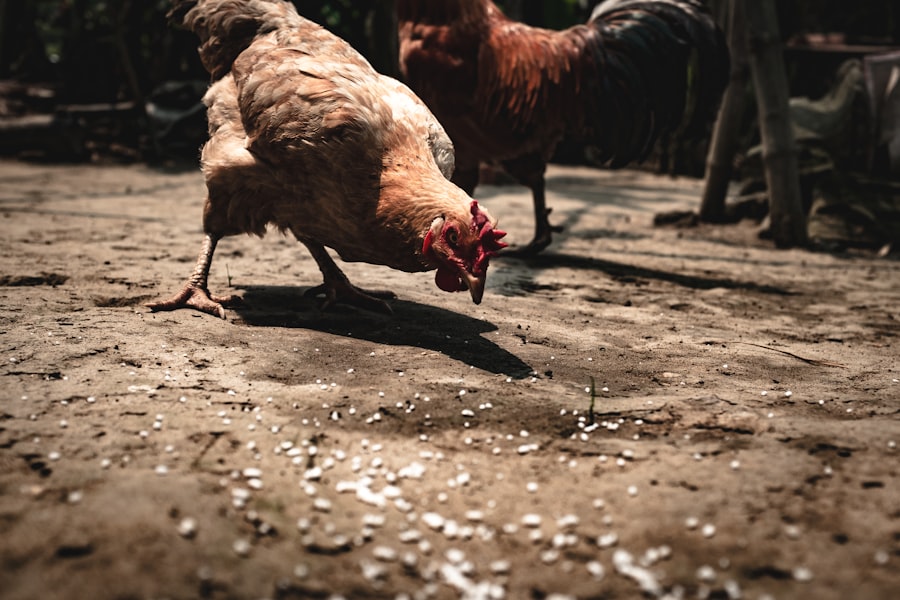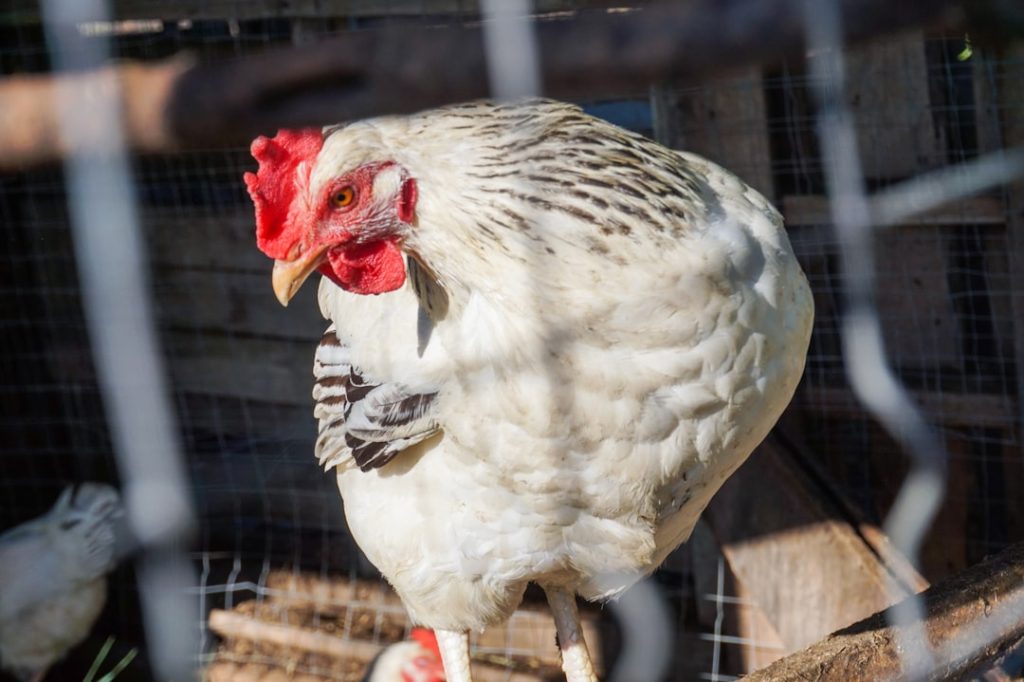When selecting chickens for a backyard coop, several factors should be considered. Climate is a crucial consideration, as some breeds are better adapted to cold weather, while others thrive in warmer conditions. The intended purpose of the chickens is also important, whether for egg production, meat, or dual-purpose use.
Popular egg-laying breeds include Rhode Island Reds and Leghorns, while Cornish Cross and Plymouth Rock are known for meat production. Temperament is another significant factor, especially for families with children or other pets. Some breeds are more docile and friendly, making them easier to handle.
The available space in the backyard should also be taken into account, as certain breeds are better suited for confinement, while others require more room to roam. Smaller breeds like bantams may be appropriate for limited spaces, while larger breeds such as Orpingtons or Australorps are better suited for free-range environments. Noise levels can be a concern, particularly in residential areas.
Some breeds are known to be more vocal than others, so selecting a quieter breed may be necessary to avoid disturbing neighbors. Ultimately, the ideal breed for a backyard coop depends on individual needs and preferences, necessitating thorough research and consideration of all relevant factors before making a decision.
Table of Contents
- 1 Setting Up the Coop
- 2 Feeding and Watering
- 3 Handling and Care
- 4 Health and Hygiene
- 5 Egg Production
- 6 Legal and Environmental Considerations
- 7 FAQs
- 7.1 What are the benefits of keeping chickens?
- 7.2 What do chickens need to thrive?
- 7.3 How many chickens should a beginner start with?
- 7.4 What should be considered when choosing a chicken breed?
- 7.5 What are some common health issues in chickens and how can they be prevented?
- 7.6 What are the legal considerations for keeping chickens?
- 7.7 How can chickens be kept safe from predators?
Key Takeaways
- When choosing a breed, consider factors such as egg production, temperament, and climate adaptability
- Set up the coop in a well-ventilated area with proper insulation and predator-proofing measures
- Provide a balanced diet for your chickens, including a mix of grains, greens, and protein
- Handle chickens gently and regularly for socialization and health checks
- Keep the coop clean and practice good hygiene to prevent diseases and parasites
- Monitor egg production and make adjustments to diet and environment as needed
- Familiarize yourself with local regulations and environmental impact of keeping chickens
Setting Up the Coop
Size and Layout Considerations
The general rule of thumb is to allow at least 2-3 square feet of space per chicken inside the coop, and 8-10 square feet per chicken in an outdoor run. This will ensure that your chickens have enough room to move around and engage in natural behaviors like scratching and dust bathing.
Ventilation and Temperature Regulation
Make sure that the coop is well-ventilated to prevent moisture buildup and ammonia levels from rising. Proper ventilation will also help regulate the temperature inside the coop, keeping your chickens comfortable in both hot and cold weather.
Materials, Security, and Amenities
In addition to size and ventilation, it’s important to consider the materials used in constructing the coop. Choose durable materials that are easy to clean and maintain, such as pressure-treated lumber or galvanized steel. Make sure that the coop is predator-proof, with secure latches and hardware cloth to prevent access from predators like raccoons or foxes. Inside the coop, provide roosting bars for your chickens to perch on at night, as well as nesting boxes for laying eggs. It’s also important to include bedding material such as straw or wood shavings to keep the coop clean and comfortable for your birds. Finally, consider adding amenities like a feeder and waterer inside the coop to ensure that your chickens have access to food and water at all times.
By carefully planning and setting up your coop, you can create a safe and comfortable home for your backyard chickens.
Feeding and Watering

Proper nutrition is essential for keeping your backyard chickens healthy and productive. When it comes to feeding your chickens, it’s important to provide a balanced diet that meets their nutritional needs. A good quality commercial feed formulated specifically for chickens is a great starting point.
Look for feeds that are appropriate for the age and purpose of your birds, whether they are chicks, layers, or meat birds. Additionally, consider supplementing their diet with kitchen scraps or garden greens to provide variety and additional nutrients. However, it’s important to avoid feeding them foods that are toxic to chickens, such as avocado, chocolate, or raw beans.
In addition to feeding, providing clean and fresh water is crucial for your chickens’ health and well-being. Make sure that your chickens have access to clean water at all times, especially during hot weather when they need to stay hydrated. Consider using a waterer that is designed specifically for chickens, as this will help prevent spills and contamination.
It’s also important to regularly clean and refill the waterer to prevent the growth of harmful bacteria. By paying attention to their diet and water intake, you can ensure that your backyard chickens stay healthy and happy.
Handling and Care
Proper handling and care are essential for maintaining the health and well-being of your backyard chickens. When handling your birds, it’s important to be gentle and calm to avoid causing unnecessary stress. Approach them slowly and avoid making sudden movements or loud noises that could startle them.
If you need to pick up a chicken, support its body with both hands to prevent injury and keep it calm. Additionally, it’s important to regularly check your chickens for signs of illness or injury. Look for symptoms such as lethargy, abnormal droppings, or changes in appetite, and seek veterinary care if necessary.
Regular grooming and maintenance are also important aspects of caring for your chickens. Keep an eye on their feathers and nails, trimming them as needed to prevent overgrowth or discomfort. Additionally, regularly clean their coop and nesting boxes to prevent the buildup of waste and bacteria.
By providing proper handling and care for your backyard chickens, you can help them stay healthy and happy.
Health and Hygiene
Maintaining good health and hygiene practices is crucial for preventing disease and ensuring the well-being of your backyard chickens. One of the most important aspects of chicken health is disease prevention through biosecurity measures. This includes limiting exposure to wild birds and other poultry, as well as practicing good hygiene when handling your chickens or their eggs.
Additionally, it’s important to regularly clean and disinfect their coop and equipment to prevent the spread of bacteria and parasites. Regular health checks are also essential for monitoring the well-being of your chickens. Keep an eye out for signs of illness or injury, such as changes in behavior or appearance.
If you notice any abnormalities, seek veterinary care as soon as possible to prevent the spread of disease within your flock. Additionally, consider vaccinating your chickens against common diseases like Marek’s disease or Newcastle disease to provide an extra layer of protection. In addition to disease prevention, maintaining good hygiene practices is important for keeping your chickens healthy.
Provide clean bedding material in their coop and regularly clean their waterer and feeder to prevent contamination. By practicing good health and hygiene habits, you can help ensure that your backyard chickens stay healthy and disease-free.
Egg Production

Nutrition for Egg Production
A good quality commercial feed formulated specifically for laying hens is crucial for providing the necessary nutrients for egg production. Additionally, consider supplementing their diet with calcium-rich foods like oyster shells or crushed eggshells to support strong eggshells.
A Comfortable Environment
Providing a comfortable environment is vital for encouraging egg production in your flock. Make sure that their coop is well-ventilated and free from drafts, as extreme temperatures can negatively impact egg production. Provide nesting boxes filled with clean bedding material where your hens can lay their eggs in a quiet and secluded area.
Collecting and Maintaining Eggs
Regularly collecting eggs from the nesting boxes is important for maintaining good hygiene and preventing egg breakage or spoilage. Check the nesting boxes at least once a day to collect any eggs that have been laid.
By providing a balanced diet and a comfortable environment for your hens, you can help maximize egg production in your backyard flock.
Legal and Environmental Considerations
Before starting a backyard chicken flock, it’s important to be aware of any legal restrictions or environmental considerations in your area. Some municipalities have zoning laws or ordinances that regulate the keeping of poultry within city limits. Make sure to check with local authorities to ensure that keeping backyard chickens is allowed in your area.
Additionally, consider the environmental impact of keeping backyard chickens on your property. Proper waste management is essential for preventing pollution and odors from affecting your neighbors or local water sources. Consider composting chicken waste or using it as fertilizer in your garden to minimize environmental impact.
By being aware of legal restrictions and environmental considerations, you can ensure that you are keeping backyard chickens responsibly and in compliance with local regulations. In conclusion, raising backyard chickens can be a rewarding experience that provides fresh eggs, natural pest control, and entertainment for the whole family. By carefully choosing the right breed, setting up a proper coop, providing a balanced diet and clean water, handling with care, maintaining good health and hygiene practices, maximizing egg production, and being aware of legal and environmental considerations, you can create a safe and comfortable environment for your flock while enjoying all the benefits of keeping backyard chickens.
If you’re considering keeping chickens, you’ll need to make sure you have the right coop and nest box setup. Poultry Wizard has a helpful article on chicken coop nest box that provides valuable information on how to set up a comfortable and safe space for your feathered friends. It’s important to consider the type of coop that is best for your chickens, as well as the flooring of the coop, which you can learn more about in their articles on what kind of coop is best for chickens and floor of chicken coop. These resources will help you get started on the right foot with your new chicken-keeping adventure.
FAQs
What are the benefits of keeping chickens?
Keeping chickens can provide a sustainable source of fresh eggs, natural pest control in the garden, and a source of organic fertilizer for plants.
What do chickens need to thrive?
Chickens need a secure and predator-proof coop, access to fresh water, a balanced diet of chicken feed, and a suitable outdoor space for foraging and exercise.
How many chickens should a beginner start with?
For beginners, it is recommended to start with 3-5 chickens. This allows for a manageable flock size while still providing enough social interaction for the chickens.
What should be considered when choosing a chicken breed?
When choosing a chicken breed, consider factors such as egg production, temperament, climate adaptability, and space requirements. Some popular beginner-friendly breeds include Rhode Island Reds, Plymouth Rocks, and Sussex.
What are some common health issues in chickens and how can they be prevented?
Common health issues in chickens include parasites, respiratory infections, and egg-laying problems. These can be prevented through regular health checks, proper nutrition, and maintaining a clean living environment.
What are the legal considerations for keeping chickens?
Before keeping chickens, it is important to check local regulations and zoning laws regarding the keeping of poultry. Some areas may have restrictions on the number of chickens allowed or specific guidelines for coop construction.
How can chickens be kept safe from predators?
To keep chickens safe from predators, it is important to secure the coop with sturdy fencing, lockable doors, and predator-proof latches. Additionally, providing a secure outdoor run and using motion-activated lights or sound deterrents can help deter predators.
Meet Walter, the feathered-friend fanatic of Florida! Nestled in the sunshine state, Walter struts through life with his feathered companions, clucking his way to happiness. With a coop that’s fancier than a five-star hotel, he’s the Don Juan of the chicken world. When he’s not teaching his hens to do the cha-cha, you’ll find him in a heated debate with his prized rooster, Sir Clucks-a-Lot. Walter’s poultry passion is no yolk; he’s the sunny-side-up guy you never knew you needed in your flock of friends!







